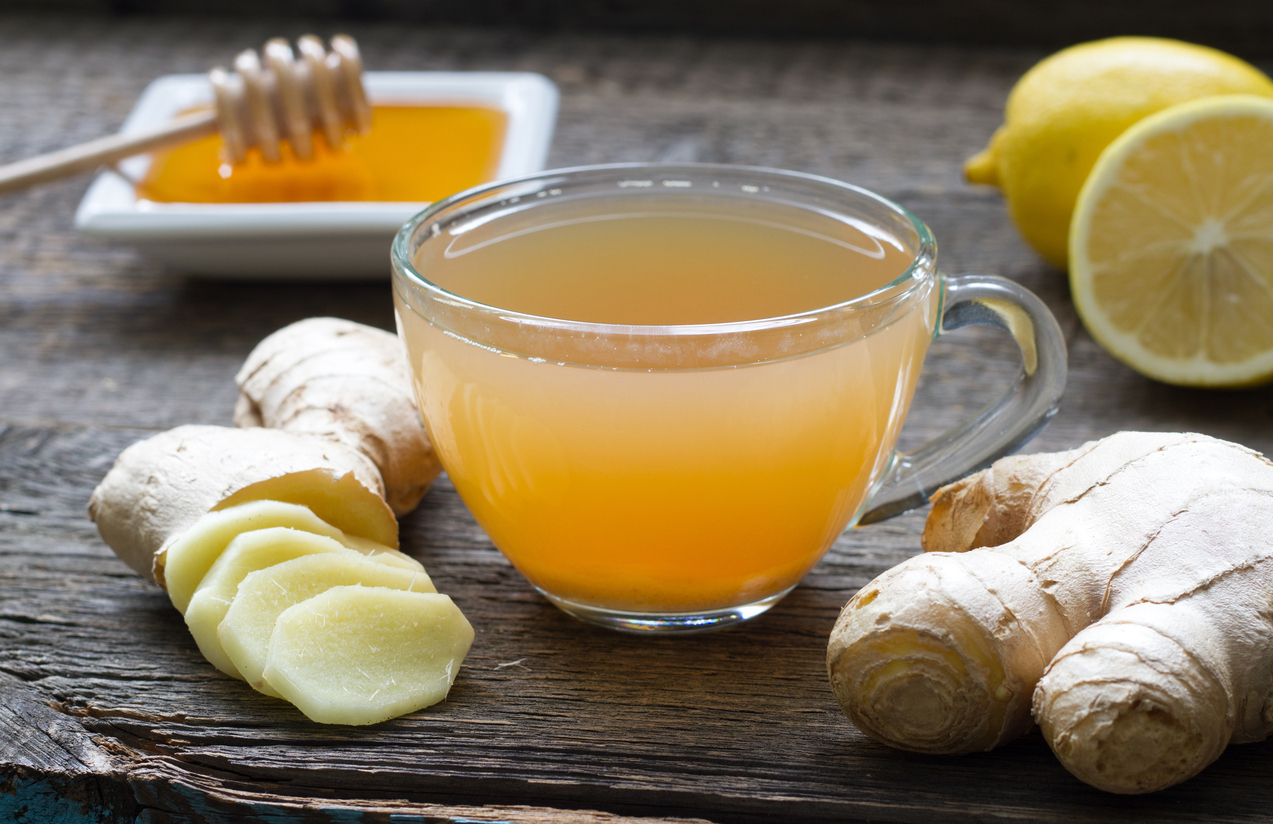
Cold weather can cause coughing and lead to dry, unproductive coughing fits.
When store-bought remedies are ineffective, or not your first choice for cough relief, home remedies that present a more natural approach to dry cough care may be the answer. If you’re looking for alternative dry cough remedies, consider trying one of the following:
Spicy Ginger Tea
Ginger, often referred to as “the universal medicine,” is used in homeopathic medicine as a natural remedy for respiratory disorders. The active component in ginger – gingerol – has proven anti-inflammatory and antioxidant effects that can help relieve a dry cough. In fact, researchers at Colombia University in New York found that ginger works as an effective bronchodilator, promoting rapid relaxation of the smooth muscle of the airways.[1]
Ingredients:
- 4 tbsp freshly shredded ginger
- 2 tsp honey
- 16 oz water
Instructions
Add ginger and water to small saucepan. Bring to a boil, remove from heat and allow to steep for 10-15 minutes. Pour half of mixture into mug and stir in honey as a natural sweetener. Save any remaining liquid for later. Drink 2 to 3 cups per day as a healing remedy for dry cough. Yield: 2 cups Spicy Ginger Tea.
Homemade Honey and Coffee Cough Syrup
If you’ve ever experienced a persistent dry cough that lingers for weeks after a cold or upper respiratory infection, you may want to try some Homemade Honey and Coffee Cough Syrup. A recent study showed that combining honey and coffee together is a more effective treatment modality than oral steroids to treat a dry cough that won’t go away.[2]
Ingredients
- 16 oz honey
- 5 oz dry or 6.5 oz liquid coffee
- 1 cup warm water
Instructions
Mix the honey and coffee together in a separate container. Add 1 tbsp of mixture to 8 ounces of warm water and stir thoroughly. Drink 3 times per day, every 8 hours.
Simple Red Onion and Brown Sugar Cough Syrup
At the top of the superhero vegetable list, onions have certain compounds in them that have long been associated with a wide range of health benefits, including anti-cancer properties, antiplatelet activity, anti-asthmatic activity and antibiotic effects.[3] Purporters of these perfect pungent plants say that onions work like an expectorant, breaking up chest congestion and soothing a spastic cough.
Ingredients
- Small to medium mason jar of your choosing
- 1 red onion (size will vary depending upon your jar)
- 1 cup brown sugar (amount may vary depending on size of your container)
Instructions
Peel and slice the onion evenly. Place the base of your onion in a jar and cover with a layer of brown sugar. Continue to alternate the layering of the onion and brown sugar. Cover tightly and allow to sit at room temperature for 12 hours. After sitting out for a spell, your jar will now contain your liquid cough syrup. Use a spoonful as needed to control your cough, up to 3 spoonfuls in an hour.
Eucalyptus Oil Inhalation
Not only does Eucalyptus oil have antimicrobial effects against many harmful bacteria, viruses and fungi, but it also has immune stimulatory, anti-inflammatory, antioxidant, analgesic (pain relief) and spasmolytic effects (relieves spasms in the smooth muscle of the airways). Application of eucalyptus oil by vapor inhalation provides benefit to both purulent (thick mucus producing) and non-purulent respiratory disorders, including bronchitis, asthma and chronic obstructive pulmonary disease (COPD).[4]
What You’ll Need
- Device for vapor inhalation
- Eucalyptus essential oil (obtain from health food store for best quality)
Instructions
Add a couple drops of eucalyptus oil to a vaporizing device. Once steam starts to form, breathe deeply until the steam subsides, usually about 10-15 minutes. As an alternative for those of you who don’t have a vaporizer, boil some water in a medium-size sauce pan. Remove from heat and add a couple drops of eucalyptus oil to the water. Leaning over the pot, cover your head and the pot with a towel. Breathe deeply for up to 15 minutes at a time.
Please note: a persistent cough may be a sign of something more serious. If your cough doesn’t go away after a week or two, be sure to make an appointment with your primary health care provider for a thorough evaluation.
Disclaimer: Before trying alternative dry cough remedies or any other alternative treatment, be sure to check with your pharmacist or primary care provider to make sure they are compatible with the medications you are taking.
[1] Townsend, E. A., Siviski, M. E., Zhang, Y., Xu, C., Hoonjan, B., & Emala, C. W. (2013). Effects of Ginger and Its Constituents on Airway Smooth Muscle Relaxation and Calcium Regulation. American Journal of Respiratory Cell and Molecular Biology, 48(2), 157–163. http://doi.org/10.1165/rcmb.2012-0231OC.
[2] Raeessi, Mohammad Ali, et. al. Honey plus coffee versus systemic steroid in the treatment of persistent post-infectious cough: a randomised controlled trial. Primary Care Respiratory Journal volume22, pages325–330 (2013).
[3] Suleria, HA., et. al. Onion: Nature’s protection against physiologic threats. Crit Rev Food Sci Nutr. 2015;55(1):50-66. doi: 10.1080/10408398.2011.646364.
[4] Sadlon AE and Lamson DW. Immune-modifying and antimicrobial effects of Eucalyptus oil and simple inhalation devices. Altern Med Rev. 2010 Apr;15(1):33-47.
Article courtesy of our partner Inogen.
